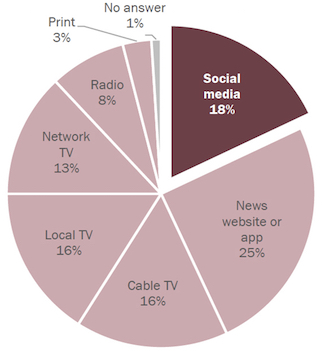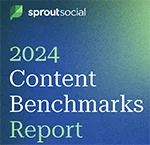Americans who depend on social media platforms for their political news tend to be less likely to follow major news stories and also generally possess less political knowledge than other groups, according to analysis recently released by the Pew Research Center.
Pew’s survey, which quizzed Americans on topics such as the COVID-19 pandemic and the upcoming presidential election, found that only eight percent of U.S. adults who get their political news primarily from social media platforms said they’re currently following news about the 2020 election “very closely,” the lowest share among the six media platforms analyzed.
By comparison, levels of engagement for election news was about four times higher among those who get their political news mostly from cable TV (37 percent) or print media (33 percent). The only group to reveal comparably low levels of engagement were audiences who rely on local TV (11 percent).
Moreover, less than a quarter (23 percent) of U.S. adults who get their political news from social media admitted they’re following news surrounding the COVID-19 crisis very closely. By contrast, the percentage of Americans who rely to cable TV, national network TV, news sites and apps or local TV all revealed higher levels of attention to coronavirus-related news (50 percent, 50 percent, 44 percent and 32 percent, respectively).
The survey tested respondents’ political knowledge and asked 29 fact-based questions focusing on current events ranging from COVID-19 to the economy to President Trump’s impeachment. Pew’s findings discovered that those who rely most on social media for political news were least likely, on average, to exhibit high political knowledge: only 17 percent of individuals who turn to social media fell into the high political knowledge category, while 45 percent of those who rely on news websites/apps, 42 percent of radio listeners and 41 percent of print readers earned this designation.
 Nearly 20 percent of U.S. adults say they get their political news primarily through social media. Nearly 20 percent of U.S. adults say they get their political news primarily through social media. |
About one-in-five U.S. adults (18 percent) reported that social media is currently their main source for political news. That’s more than the number of Americans who said they get most of their political news from print (three percent), radio (eight percent), network TV (13 percent), local TV (16 percent) or cable TV (16 percent). According to Pew’s findings, news websites and apps are now the number-one sources a majority of Americans turn to for political news (25 percent).
Finally, Pew’s analysis found that Americans who use social media for political news were less likely to express concern regarding the fake news phenomenon. While more than half (58 percent) of those who rely on cable TV expressed high levels of concern regarding fake news’ potential influence on the 2020 election, only a little more than a third (37 percent) of social media users reporting being concerned about it.
Despite this, social media news users were more likely to have been exposed to false or unproven claims than other media audiences. About eight-in-ten (81 percent) have heard the conspiracy theory that COVID-19 pandemic was intentionally planned, higher than any other media audience. Altogether, more than two-thirds of social media news users (68 percent) admitted they’ve encountered coronavirus-related misinformation.
Pew’s analysis was based on data drawn from five separate surveys conducted between October 2019 and June 2020. Those surveys were conducted as part of the nonpartisan think tank’s Election News Pathways project, an ongoing initiative that examines how Americans are getting their news in the months leading up to the 2020 election.


 What if companies could harness the fury of online outrage into a force for good? This is precisely where companies can start turning the trolls into brand champions.
What if companies could harness the fury of online outrage into a force for good? This is precisely where companies can start turning the trolls into brand champions. Audiences interacted with brand content far more often on Facebook and Instagram in 2023 than they did via X (formerly Twitter), according to a report that tracked engagement trends across different social networks.
Audiences interacted with brand content far more often on Facebook and Instagram in 2023 than they did via X (formerly Twitter), according to a report that tracked engagement trends across different social networks. Can public relations help counteract the dissension fostered by the power of digital platforms to spread hate, fear and confusion?
Can public relations help counteract the dissension fostered by the power of digital platforms to spread hate, fear and confusion? The number of Americans who get their news from TikTok has quadrupled in the last three years, according to a recent Pew Research Center report.
The number of Americans who get their news from TikTok has quadrupled in the last three years, according to a recent Pew Research Center report.


 Have a comment? Send it to
Have a comment? Send it to 
No comments have been submitted for this story yet.